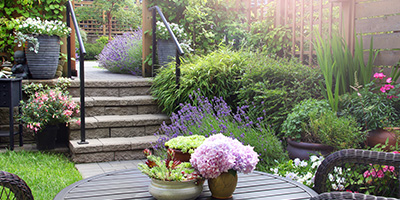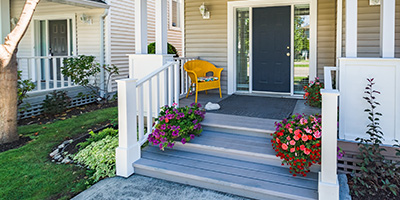Top 11 Privacy Trees

The Best Trees for Privacy in Your Yard
Looking to make your backyard more private and more beautiful? Trees provide the best of both worlds, adding natural screening and interest wherever you plant them. Depending on your goals, you can use trees strategically to create a tree fence, block an unsightly view or shield your backyard from neighbors and street traffic.
Planting fast-growing privacy trees can help you gain valuable privacy more quickly and makes a sustainable, eco-friendly alternative to a traditional privacy fence — and that’s only the beginning.

“The benefits of using trees for privacy are endless. They have low-maintenance qualities, help seclude you from nosy neighbors, provide lush green landscape year-round (especially if they are evergreen), shield your property from wind and noise, create shade and offer beautiful scenery to view.”
Alex Kantor, Perfect Plants
Missy Henriksen of the National Association of Landscape Professionals adds, “While traditional fences can be installed almost anywhere, a ‘green fence’ needs sunlight and water to thrive.” Space, growing conditions and climate are other important considerations when choosing the best trees for privacy. Find the right options for your backyard with this breakdown of popular privacy tree options.
Fast-Growing Privacy Trees to the Rescue
When on the hunt for good trees for privacy, growing time is a major consideration. While some of the trees on this list grow faster than others, one way to expedite your privacy goals is by purchasing mature trees, which are partially or fully grown.
Granted, this will cost more upfront — and there are special considerations when it comes to planting mature trees — but if you’re looking for results now, keep this option on your radar.
1. Eastern Redcedar
For a large, rugged privacy tree that provides full coverage, the Eastern redcedar is the conifer for you. “Evergreen plants like broadleafs or conifers are generally a good choice for year-round effectiveness,” according to Henriksen, making this durable juniper a great tree fence option. Its red, aromatic wood and thick foliage will give your backyard an earthy fragrance and attract local birds and other wildlife.
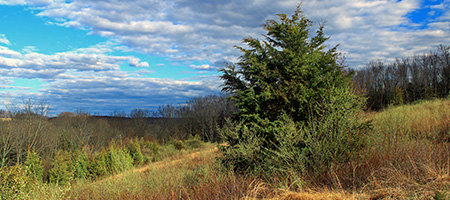
What You Need to Know
- Height Range: 40 to 60 feet
- Width Range: 10 to 20 feet
- Sunlight Guidelines: Full to partial (4 to 8 hours of direct sun per day)
- Planting Guidelines: Eastern redcedars can reach 60 feet high and 20 feet wide at maturity, so they’re best suited for larger backyards. If you have the space, make sure to plant these about 20 feet apart and away from power lines or neighboring homes.
- Preferred Climate: 3-9 outdoor growing zone, hardy down to -30 degrees Fahrenheit. This fast-growing privacy tree is one of the hardiest and most tolerant options available, thriving in cold, hot, dry and wet areas across the U.S.
- Garden Styles Suited For: Natural or rustic
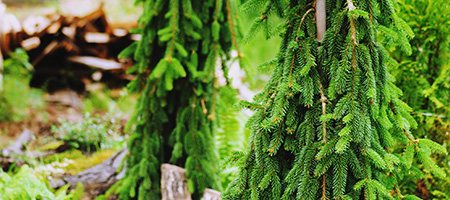
2. Weeping White Spruce
For elegant, year-round coverage, weeping white spruce trees deserve a special mention. With an average lifespan of 50 years, these impressive trees have blue-green foliage that drapes downward, creating natural screening. Weeping white spruce trees add striking interest to any backyard and are sometimes used as specimen trees.
For maximum privacy, consider using multiple weeping white spruce trees as the foundation of your tree fence. While they will get taller each year, their width stays compact, providing a nice alternative when you need attractive vertical coverage in a narrower space.
What You Need to Know
- Height Range: 30 feet to 50 feet
- Width Range: 6 to 10 feet
- Sunlight Guidelines: Full sun or partial shade
- Planting Guidelines: Weeping white spruce trees grow very tall, so plant them in an area with unlimited overhead clearance, away from power lines. Once established, they will grow about 1 to 2 feet per year.
- Preferred Climate: 2-9 outdoor growing zone. Hardy down to -50 F, this evergreen can tolerate sandy soils along with moderate to dry conditions once established.
- Garden Styles Suited For: Natural or rustic
3. Leyland Cypress
One of the most popular trees for privacy, the Leyland cypress is a beautiful, fast-growing evergreen that is great for solid, full coverage in large backyards. They have been known to reach heights of 50 feet in just 15 years. When planted in a row, they create an impenetrable mass of branches that make them great trees for screening wind, snow and even noise.
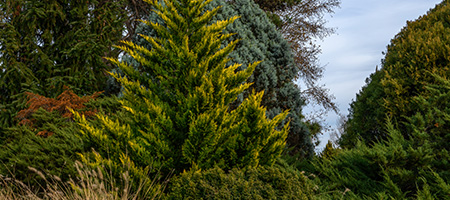
What You Need to Know
- Height Range: 40 to 60 feet in rows, 70 feet alone
- Width Range: 15 to 20 feet in rows, 30 feet alone
- Sunlight Guidelines: Full (6+ hours of direct sun per day)
- Planting Guidelines: Leyland cypress trees can handle droughts, pests and even air pollution, and their high tolerance to salt makes them good trees for privacy in coastal areas.
- Preferred Climate: 6-10 outdoor growing zone, hardy down to 0 F. These are one of the fastest growing evergreen trees and great for defining property lines as a tree fence. Due to their shallow root system, these trees are not well-adapted to hot summers and are susceptible to root rot. They do best in large, well-drained yards with mild to moderate temperature highs.
- Garden Styles Suited For: Mediterranean or traditional
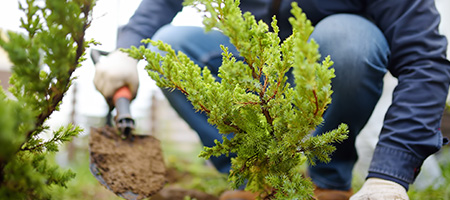
4. Spartan Juniper
If your yard can’t accommodate some of the larger trees for privacy, the spartan juniper is a great option for mid-sized backyards. Planted in a row, Spartan junipers add a stately, uniform look to any backyard, and their compact foliage makes them effective windbreak trees.
What You Need to Know
- Height Range: 15 feet
- Width Range: 3 to 5 feet
- Sunlight Guidelines: Full (6+ hours of direct sun per day)
- Planting Guidelines: Spartan junipers prefer dryer soil and lots of sunlight. To prevent root rot and other ailments, make sure to not overwater them and plant them about 5 feet apart. These trees don’t do well with heavy pruning, so be sure to plant them in spaces they will fit naturally at their full size.
- Preferred Climate: 5-9 outdoor growing zone, hardy down to -10 F. These are water-efficient trees, which can be watered by natural rainfall after the first year of planting, though if there is a drought you should water them 1 inch per week. The Spartan juniper can handle hot or cold temperatures and keeps its dark green color all year.
- Garden Styles Suited For: Contemporary, Mediterranean or zen
5. Sky Pencil Holly
Looking for good trees for privacy that take up very little space? Sky pencil holly is the right tree for you. With a mature height between 8 and 10 feet tall and a width of just 2 feet, sky pencil hollies act as the ultimate space-saving privacy trees while still providing solid protection from wind, noise and wandering eyes.
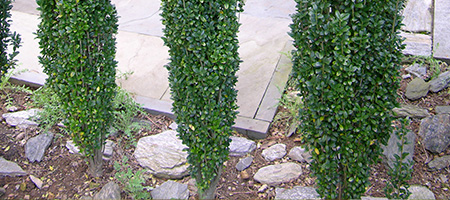
What You Need to Know
- Height Range: 8 to 10 feet
- Width Range: 2 feet
- Sunlight Guidelines: Full to partial (3 to 6+ hours of direct sun per day)
- Planting Guidelines: Sky pencil hollies thrive both in the ground and in decorative containers. Unlike their thorny cousin, the holly bush, their foliage is soft to the touch, making them among the best trees for privacy on patios, urban decks and small backyards.
- Preferred Climate: 5-9 outdoor growing zone, hardy down to -10 F. These privacy trees prefer light, moist soil but are adaptable to different climates. Like many evergreens, these plants can develop root rot if overwatered, so be sure to give them a well-drained environment.
- Garden Styles Suited For: Contemporary or zen

Working on a backyard makeover?
Find the best way to get rid of dirt, rocks and yard waste from your landscaping project.
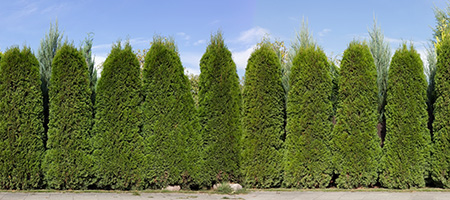
6. Green Giant Thuja (Arborvitae)
The Green Giant Thuja is widely considered one of the best trees for privacy, making it a fan favorite in many backyards. “Thujas are one of our most popular trees,” says Kantor. “They are extremely fast-growing, provide privacy quickly and are also cold hardy. They can survive in a multitude of climates and are not affected by many pests or diseases.”
Their uniform, cone-like shape and consistent annual growth rate of 3 to 5 feet make for a polished tree fence that requires very little pruning to maintain. You can trim the tops regularly for a classic, French Renaissance feel or leave them alone for a more natural look.
What You Need to Know
- Height Range: 30 to 40 feet
- Width Range: 5 to 8 feet in rows
- Sunlight Guidelines: Full to partial (3 to 6+ hours of direct sun per day)
- Planting Guidelines: If you like the height and density of Leyland cypress but don’t have the conditions to maintain it, the Green Giant is a great alternative. Just be sure to have a defense against deer on hand, as their soft leaves and branches are irresistible to these native grazers.
- Preferred Climate: 5-9 outdoor growing zone, hardy down to -10 F. These durable, fast growing privacy trees are tolerant of heat and humidity, as well as drought and different types of soil. However, the planting site must have proper drainage.
- Garden Styles Suited For: Contemporary, traditional or rustic
7. Emerald Green Thuja (Arborvitae)
With a mature height of just 12 to 14 feet, emerald green Thuja offers the classic beauty of its giant cousin at half the size. Their controlled growth rate of just 6 to 9 inches per year makes them a great choice for landscaping areas that are limited in space.
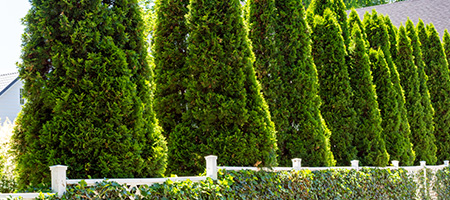
What You Need to Know
- Height Range: 12 to 14 feet
- Width Range: 3 to 4 feet in rows
- Sunlight Guidelines: Full to partial (3 to 6+ hours of direct sun per day)
- Planting Guidelines: These beauties are a great choice for mid-sized yards, and their slender shape makes them ideal as foundation plants along the home — just be sure to give them enough room to grow vertically. When planting these trees for privacy or wind blockage, it’s best to space them about 2 feet apart for optimal coverage.
- Preferred Climate: 3-8 outdoor growing zone, hardy down to -30 F. These privacy trees are very adaptable, resistant to snow and ice, drought-tolerant and will thrive in most climates.
- Garden Styles Suited For: Contemporary, Mediterranean, zen or rustic
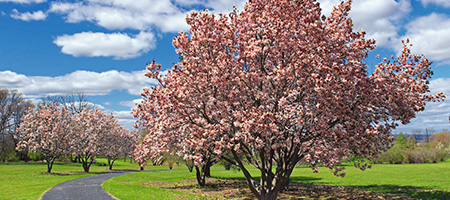
8. Flowering Dogwood
Flowering dogwoods are good trees for privacy if you’re looking for seasonal coverage with a pop of color. Dogwoods come in a variety of colors including white, pink and red, and their ornamental berries will make your backyard popular with local robins, cardinals and blue jays.
What You Need to Know
- Height Range: 15 to 25 feet
- Width Range: 15 to 25 feet
- Sunlight Guidelines: Full to partial (3 to 6+ hours of direct sun per day)
- Planting Guidelines: Dogwoods do best in large to mid-sized backyards. Their beautiful, compact blooms are great for vertically extending an existing privacy fence when planted 20 feet apart. They can also be strategically placed for spot coverage — for instance, blocking your neighbor’s favorite view of your lawn chairs.
- Preferred Climate: 5-8 outdoor growing zone, hardy down to -10 F. These trees prefer well-drained soil that is not too dry and can thrive year-round in both hot and cold climates.
- Garden Styles Suited For: Traditional or rustic
9. Weeping Podocarpus
These fast-growing, woody evergreens are among the best trees for privacy in places like Florida and California. Weeping Podocarpus trees have plush, billowing foliage and work well as spot privacy trees or in a full natural privacy tree fence.
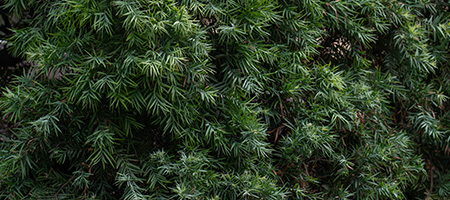
What You Need to Know
- Height Range: 35 to 45 feet
- Width Range: 10 to 20 feet
- Sunlight Guidelines: Full to partial (3 to 6+ hours of direct sun per day)
- Planting Guidelines: These privacy trees do best on large properties and should be planted 10 to 15 feet away from homes and other buildings. When planting in a row, allow about 5 to 10 feet of space between each tree.
- Preferred Climate: 9-11 outdoor growing zone, hardy down to 20 F. This tree’s drought tolerance, preference for dry soil and ability to thrive in mildly salty conditions make it an ideal choice for southern and coastal areas.
- Garden Styles Suited For: Tropical, contemporary or rustic
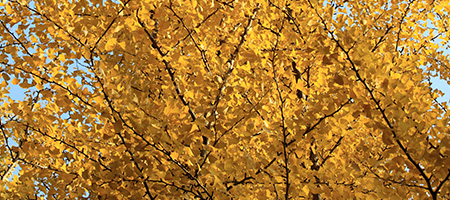
10. Goldspire Ginkgo
For privacy trees that are as beautiful as they are functional, try lining your yard with Goldspire Ginkgo. These unique trees take on a narrow, pyramidal shape with their deep green summertime leaves giving way to stunning golden hues each fall.
What You Need to Know
- Height Range: 14 to 16 feet
- Width Range: 5 to 6 feet
- Sunlight Guidelines: Full to partial (3 to 6+ hours of direct sun per day)
- Planting Guidelines: The Goldspire Ginkgo is a durable, smog-resistant tree that will do well in mid-sized backyards. Just be careful not to confuse it for its cousin, the Ginkgo. Ginkgo trees can reach sizes of 40 to 60 feet, and their berries smell awful. Goldspire Ginkgos are specifically bred for their smaller, slender shape and lack the pungent fruit of their cousins.
- Preferred Climate: 4-9 outdoor growing zone, hardy down to -20 F. This versatile, low-maintenance privacy tree thrives in a wide variety of climates. Natural rainfall should supply its water needs after the first year of planting, though the soil must have proper drainage.
- Garden Styles Suited For: Zen or traditional
What’s the Fastest Growing Privacy Tree?
When you need privacy quickly, but still desire a natural screening option, which tree is best? Look no further than the hybrid willow.
11. Hybrid Willow Tree
Hybrid willows have a growth rate of 6 to 10 feet per year, and this disease-resistant plant typically reaches its mature height in just five years. They were bred to quickly form a thick wall that blocks out neighbors and noise. These privacy trees grow well even in cold environments, and their dense foliage makes them great windbreak trees. They’re also great for drying out swampy soil.
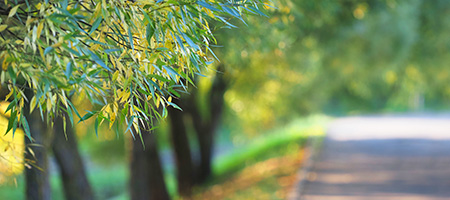
What You Need to Know
- Height Range: 35 to 45 feet in rows, 75 feet alone
- Width Range: 20 feet
- Sunlight Guidelines: Full to partial (3 to 6+ hours of direct sun per day)
- Planting Guidelines: Hybrid willows require a lot of water but can withstand periods of drought with the right maintenance. These plants do best in mid-sized to large yards. If spaced incorrectly, they can reach a towering 75 feet in height, so to create a manageable hybrid willow tree fence, be sure to plant them about 5 feet apart.
- Preferred Climate: 4-9 outdoor growing zone, hardy down to -20 F. Considered to be the fastest growing privacy tree, it’s tolerant of a variety of growing conditions and can fill common trouble spots in the yard.
- Garden Styles Suited For: Traditional, contemporary or zen
Decided on the perfect tree for your landscaping project?
Here's how to plant it!
What Are the Best Privacy Trees for Your Backyard?
“When selecting plants for a fence, it’s important to take into consideration the specific region of the country where you live,” says Henriksen. If you’re ever unsure about a tree’s fit, just ask a nearby landscape expert. They have extensive knowledge of trees that provide privacy and will also thrive in your local climate.
Take measurements and have a few pictures of your backyard on hand so they have some idea of the space you’re working with. And always remember that good privacy trees make good neighbors.

